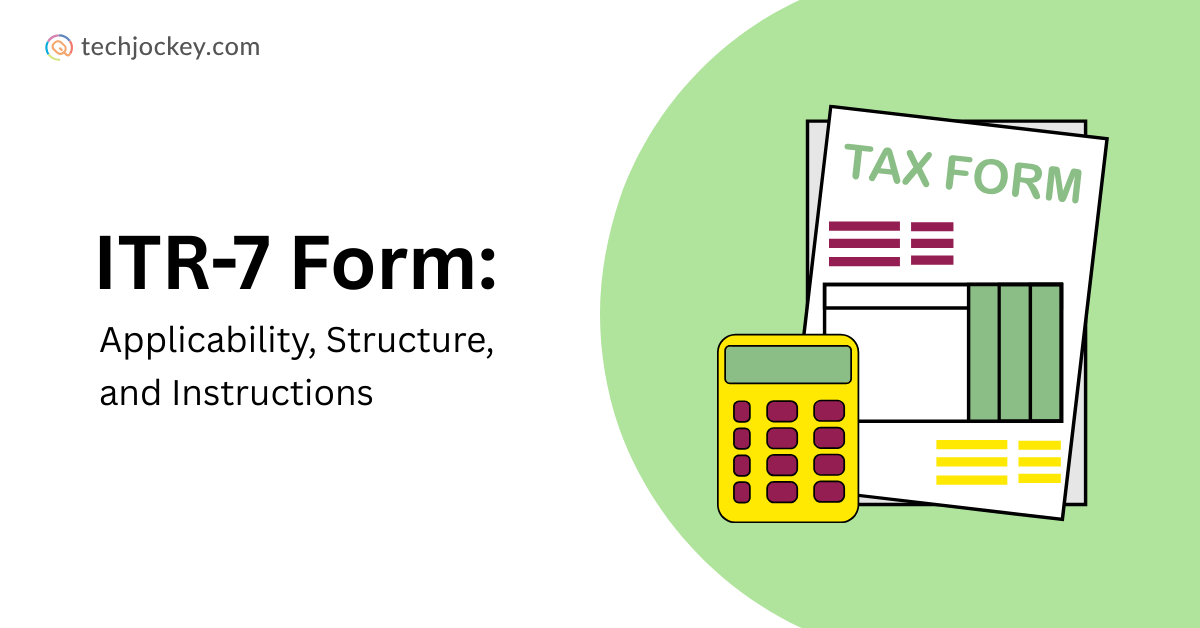
Income tax filing is essential for every taxpayer in India. But what’s more important is to know which type of ITR form you need to file.
Various types of taxpayers, such as individuals, companies, and trusts, have to file different forms depending on the nature of the income they generate.
ITR-7 is one such form that is both very important and confusing to many people. It is designed to be used by institutions, trusts, and political parties that have specific reporting obligations under the Income Tax Act. In case you are linked with a charitable organization, research body, or even a political party, it is important to learn ITR-7 to remain compliant.
In this blog, we will discuss all the details you need to know about ITR-7, such as eligibility, due dates, recent modifications, and filing procedure.
ITR-7 is for entities that are required to file returns under specified sections of the Income Tax Act, 1961.
In simple terms, ITR-7 is for organizations that do not focus on personal or commercial profit, but still need to disclose their income and claim exemptions as per law. For example, trusts, political parties, NGOs, etc.
ITR-7 applicability can be explained as follows:
For FY 2024-25, the Central Board of Direct Taxes (CBDT) has made some important changes to the ITR-7 form.
Below are the updates mentioned:
1. Capital Gains Split
2. Buyback Loss Reporting
3. TDS Section Reporting
Taxpayers must specify TDS sections in the “Details of TDS Deducted” schedule to improve accuracy and reconciliation.
4. Home Loan Interest Disclosure (u/s 24)
These changes aim to make disclosures more transparent and prevent misuse of tax provisions.
As a taxpayer, you can file ITR in several ways depending on your comfort:
Suggested Read: How to File ITR-7
For Financial Year (FY) 2024-25, the last date to file ITR-7 depends on whether an audit is required. The deadline for non-audit cases is September 16, 2025, while for audit cases, the last date is October 31, 2025. ITR-7 is used by specific entities like charitable trusts, political parties, and universities that are required to file returns under certain sections of the Income Tax Act. It’s important to meet these deadlines to avoid a late fee, although a belated return can still be filed until December 31, 2025.
Last Thoughts
Summarizing the blog, while other types of ITR forms cater to individuals or businesses, it is made for special entities like NGOs, trusts, charity institutes, or political parties. You must file the form on or before the due date to avoid any late charges and maintain proper compliance.
Since this ITR form has multiple sections of the Income Tax Act, it is advised to properly check the eligibility criteria before you file it. Also, staying updated with the latest changes in every ITR form will ensure smooth filing without errors.
ITR-5 is to be used by partnership firms, LLPs, AOPs, and some companies having business income. ITR-7, however, applies to trusts, political parties, institutions, and other entities that have their returns under Sections 139(4A)-(4F).
ITR-7 form is used for charitable and religious trusts under Section 139(4A).
Due date for ITR-7 in FY 2024-25 (AY 2025-26) is 15 September 2025 for non-audit cases and 31 October 2025 for audit cases.
When people talk about growth in digital businesses, they usually mean speed. Faster sign-ups… Faster… Read More
Key Points: Concurrency control manages multiple transactions running at the same time. It prevents conflicts… Read More
Republic Day is not just date on the calendar; it’s an emotion for every… Read More
India’s financial regulators have lately turned digital accessibility into binding requirement. This significant shift… Read More
Managing transportation in this day and age means much more than simply moving certain items… Read More
Software nowadays dictates how people connect, absorb knowledge, purchase items, and work in almost every… Read More